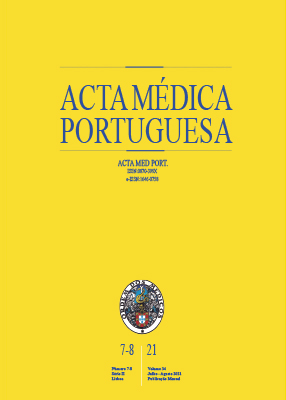Migration of Junior Doctors: The Case of Psychiatric Trainees in Portugal
DOI:
https://doi.org/10.20344/amp.12562Keywords:
Emigration and Immigration, Internship and Residency, Job Satisfaction, Motivation, Physicians, Portugal, Psychiatry, WorkplaceAbstract
Introduction: In the last few decades, the rates of international medical migration have continuously risen. In Psychiatry, there is great disparity in the workforce between high and low-income countries. Yet, little is known about the ‘push’ and ‘pull’ factors and the migratory intentions of trainees. This study aims to assess the factors impacting the decisions of psychiatric trainees in Portugal towards migration.
Material and Methods: A questionnaire was developed in the Brain Drain study and was distributed to psychiatric trainees in Portugal.
Results: The sample consists of 104 psychiatric trainees (60.6% female). Overall, 40.4% of the trainees had prior experience of living abroad and the majority (96.9%) felt that this experience influenced their attitude towards migration in a positive way. About 75% of trainees had ‘ever’ considered leaving the country, but the majority (70.0%) had not taken any ‘practical steps’ towards migration. The main reasons to stay in Portugal were personal, while the main reason to leave was financial. The majority of the trainees (55.7%) were dissatisfied or very dissatisfied with their income, working conditions and academic opportunities.
Discussion: Working conditions, salaries and academic opportunities are the main triggers for the migration of psychiatric trainees from Portugal.
Conclusion: These results may inform the decisions of stakeholders in the health and education sectors and point out the necessary investments required and the impact it may have on the workforce.
Downloads
Downloads
Published
How to Cite
Issue
Section
License
All the articles published in the AMP are open access and comply with the requirements of funding agencies or academic institutions. The AMP is governed by the terms of the Creative Commons ‘Attribution – Non-Commercial Use - (CC-BY-NC)’ license, regarding the use by third parties.
It is the author’s responsibility to obtain approval for the reproduction of figures, tables, etc. from other publications.
Upon acceptance of an article for publication, the authors will be asked to complete the ICMJE “Copyright Liability and Copyright Sharing Statement “(http://www.actamedicaportuguesa.com/info/AMP-NormasPublicacao.pdf) and the “Declaration of Potential Conflicts of Interest” (http:// www.icmje.org/conflicts-of-interest). An e-mail will be sent to the corresponding author to acknowledge receipt of the manuscript.
After publication, the authors are authorised to make their articles available in repositories of their institutions of origin, as long as they always mention where they were published and according to the Creative Commons license.









